- Home
- Alice Munro
Julieta (Movie Tie-in Edition) Page 7
Julieta (Movie Tie-in Edition) Read online
Page 7
—
Light from the last streetlight in town now fell across Juliet’s bed. The big soft maple tree had been cut down, replaced by a patch of Sam’s rhubarb. Last night she had left the curtains closed to shade the bed, but tonight she felt that she needed the outside air. So she had to switch the pillow down to the foot of the bed, along with Penelope, who had slept like an angel with the full light in her face.
She wished she had drunk a little of the whisky. She lay stiff with frustration and anger, composing in her head a letter to Eric. I don’t know what I’m doing here, I should never have come here, I can’t wait to go home.
Home.
—
When it was barely light in the morning, she woke to the noise of a vacuum cleaner. Then a voice—Sam’s—interrupted this noise, and she must have fallen asleep again. When she woke up later, she thought it must have been a dream. Otherwise Penelope would have woken up, and she hadn’t.
The kitchen was cooler this morning, no longer full of the smell of simmering fruit. Irene was fixing little caps of gingham cloth, and labels, onto all the jars.
“I thought I heard you vacuuming,” said Juliet, dredging up cheerfulness. “I must have dreamed it. It was only about five o’clock in the morning.”
Irene did not answer for a moment. She was writing on a label. She wrote with great concentration, her lips caught between her teeth.
“That was her,” she said when she had finished. “She woke your dad up and he had to go and make her quit.”
This seemed unlikely. Yesterday Sara had left her bed only to go to the bathroom.
“He told me,” said Irene. “She wakes up in the middle of the night and thinks she’s going to do something and then he has to get up and make her quit.”
“She must have a spurt of energy then,” said Juliet.
“Yeah.” Irene was getting to work on another label. When that was done, she faced Juliet.
“Wants to wake your dad up and get attention, that’s it. Him dead tired and he’s got to get out of bed and tend to her.”
Juliet turned away. Not wanting to set Penelope down—as if the child wasn’t safe here—she juggled her on one hip while she fished the egg out with a spoon, tapped and shelled and mashed it with one hand.
While she fed Penelope she was afraid to speak, lest the tone of her voice alarm the baby and set her wailing. Something communicated itself to Irene, however. She said in a more subdued voice—but with an undertone of defiance—“That’s just the way they get. When they’re sick like that, they can’t help it. They can’t think about nobody but themselves.”
—
Sara’s eyes were closed, but she opened them immediately. “Oh, my dear ones,” she said, as if laughing at herself. “My Juliet. My Penelope.”
Penelope seemed to be getting used to her. At least she did not cry, this morning, or turn her face away.
“Here,” said Sara, reaching for one of her magazines. “Set her down and let her work at this.”
Penelope looked dubious for a moment, then grabbed a page and tore it vigorously.
“There you go,” said Sara. “All babies love to tear up magazines. I remember.”
On the bedside chair there was a bowl of Cream of Wheat, barely touched.
“You didn’t eat your breakfast?” Juliet said. “Is that not what you wanted?”
Sara looked at the bowl as if serious consideration was called for, but couldn’t be managed.
“I don’t remember. No, I guess I didn’t want it.” She had a little fit of giggling and gasping. “Who knows? Crossed my mind—she could be poisoning me.
“I’m just kidding,” she said when she recovered. “But she’s very fierce. Irene. We mustn’t underestimate—Irene. Did you see the hairs on her arms?”
“Like cats’ hairs,” said Juliet.
“Like skunks’.”
“We must hope none of them get into the jam.”
“Don’t make me—laugh any more—”
Penelope became so absorbed in tearing up magazines that in a while Juliet was able to leave her in Sara’s room and carry the Cream of Wheat out to the kitchen. Without saying anything, she began to make an eggnog. Irene was in and out, carrying boxes of jam jars to the car. On the back steps, Sam was hosing off the earth that clung to the newly dug potatoes. He had begun to sing—too softly at first for his words to be heard. Then, as Irene came up the steps, more loudly.
“Irene, good ni-i-ight,
Irene, good night,
Good night, Irene, good night, Irene,
I’ll see you in my dreams.”
Irene, in the kitchen, swung around and yelled, “Don’t sing that song about me.”
“What song about you?” said Sam, with feigned amazement. “Who’s singing a song about you?”
“You were. You just were.”
“Oh—that song. That song about Irene? The girl in the song? By golly—I forgot that was your name too.”
He started up again, but humming, stealthily. Irene stood listening, flushed, with her chest going up and down, waiting to pounce if she should hear a word.
“Don’t you sing about me. If it’s got my name in it, it’s about me.”
Suddenly Sam burst out in full force.
“Last Saturday night I got married,
Me and my wife settled down—”
“Stop it. You stop it,” cried Irene, wide-eyed, inflamed. “If you don’t stop I’ll go out there and squirt the hose on you.”
—
Sam was delivering jam, that afternoon, to various grocery stores and a few gift shops which had placed orders. He invited Juliet to come along. He had gone to the hardware store and bought a brand-new baby’s car seat for Penelope.
“That’s one thing we don’t have in the attic,” he said. “When you were little, I don’t know if they had them. Anyway, it wouldn’t have mattered. We didn’t have a car.”
“It’s very spiffy,” said Juliet. “I hope it didn’t cost a fortune.”
“A mere bagatelle,” said Sam, bowing her into the car.
Irene was in the field picking more raspberries. These would be for pies. Sam tooted the horn twice and waved as they set off, and Irene decided to respond, raising one arm as if batting away a fly.
“That’s a dandy girl,” Sam said. “I don’t know how we would have survived without her. But I imagine she seems pretty rough to you.”
“I hardly know her.”
“No. She’s scared stiff of you.”
“Surely not.” And trying to think of something appreciative or at least neutral to say about Irene, Juliet asked how her husband had been killed at the chicken barn.
“I don’t know if he was a criminal type or just immature. Anyway, he got in with some goons who were planning a sideline in stolen chickens and of course they managed to set off the alarm and the farmer came out with a gun and whether he meant to shoot him or not he did—”
“My God.”
“So Irene and her in-laws went to court but the fellow got off. Well, he would. It must have been pretty hard on her, though. Even if it doesn’t seem that the husband was much of a prize.”
Juliet said that of course it must have been, and asked him if Irene was somebody he had taught at school.
“No no no. She hardly got to school, as far as I can make out.”
He said that her family had lived up north, somewhere near Huntsville. Yes. Somewhere near there. One day they all went into town. Father, mother, kids. And the father told them he had things to do and he would meet them in a while. He told them where. When. And they walked around with no money to spend, until it was time. And he just never showed up.
“Never intended to show up. Ditched them. So they had to go on welfare. Lived in some shack out in the country, where it was cheap. Irene’s older sister, the one who was the mainstay, more than the mother, I gather—she died of a burst appendix. No way of getting her into town, snowstorm on and they didn’t have a phon
e. Irene didn’t want to go back to school then, because her sister had sort of protected her from the way the other kids would act towards them. She may seem thick-skinned now but I guess she wasn’t always. Maybe even now it’s more of a masquerade.”
And now, he said, now Irene’s mother was looking after the little boy and the little girl, but guess what, after all these years the father had shown up and was trying to get the mother to go back to him, and if that should happen Irene didn’t know what she’d do, since she didn’t want her kids near him.
“They’re cute kids, too. The little girl has some problem with a cleft palate and she’s already had one operation but she’ll need another later on. She’ll be all right. But that’s just one more thing.”
One more thing.
What was the matter with Juliet? She felt no real sympathy. She felt herself rebelling, deep down, against this wretched litany. It was too much. When the cleft palate appeared in the story what she had really wanted to do was complain. Too much.
She knew she was wrong, but the feeling would not budge. She was afraid to say anything more, lest out of her mouth she betray her hard heart. She was afraid she would say to Sam, “Just what is so wonderful about all this misery, does it make her a saint?” Or she might say, most unforgivably, “I hope you don’t mean to get us mixed up with people like that.”
“I’m telling you,” Sam said, “at the time she came to help us out I was at wits’ end. Last fall, your mother was a downright catastrophe. And not exactly that she was letting everything go. No. Better if she had let everything go. Better if she’d done nothing. What she did, she’d start one job up and then she could not get on with it. Over and over. Not that this was anything absolutely new. I mean, I always had to pick up after her and look after her and help her do the housework. Me and you both—remember? She’d always been this sweet pretty girl with a bad heart and she was used to being waited on. Once in a while over the years it did occur to me she could have tried harder.
“But it got so bad,” he said. “It got so I’d come home to the washing machine in the middle of the kitchen floor and wet clothes slopping all over the place. And some baking mess she’d started on and given up on, stuff charred to a crisp in the oven. I was scared she’d set herself on fire. Set the house on fire. I’d tell her and tell her, stay in bed. But she wouldn’t and then she’d be all in this mess, crying. I tried a couple of girls coming in and they just couldn’t handle her. So then—Irene.
“Irene,” he said with a robust sigh. “I bless the day. I tell you. Bless the day.”
But like all good things, he said, this must come to an end. Irene was getting married. To a forty- or fifty-year-old widower. Farmer. He was supposed to have money and for her sake Sam guessed he hoped it was true. Because the man did not have much else to recommend him.
“By Jesus he doesn’t. As far as I can see he’s only got one tooth in his head. Bad sign, in my opinion. Too proud or stingy to get choppers. Think of it—a grand-looking girl like her.”
“When is the event?”
“In the fall sometime. In the fall.”
—
Penelope had been sleeping all this time—she had gone to sleep in her car seat almost as soon as they started to move. The front windows were down and Juliet could smell the hay, which was freshly cut and baled—nobody made hay coils anymore. Some elm trees were still standing, marvels now, in their isolation.
They stopped in a village built all along one street in a narrow valley. Bedrock stuck out of the valley walls—the only place for many miles around where such massive rocks were to be seen. Juliet remembered coming here when there was a special park which you paid to enter. In the park there was a fountain, a teahouse where they served strawberry shortcake and ice cream—and surely other things which she could not remember. Caves in the rock were named after each of the Seven Dwarfs. Sam and Sara had sat on the ground by the fountain eating ice cream while she had rushed ahead to explore the caves. (Which were nothing much, really—quite shallow.) She had wanted them to come with her but Sam had said, “You know your mother can’t climb.”
“You run,” Sara had said. “Come back and tell us all about it.” She was dressed up. A black taffeta skirt that spread in a circle around her on the grass. Those were called ballerina skirts.
It must have been a special day.
Juliet asked Sam about this when he came out of the store. At first he could not remember. Then he did. A gyp joint, he said. He didn’t know when it had disappeared.
Juliet could see no trace anywhere along the street of a fountain or a teahouse.
“A bringer of peace and order,” Sam said, and it took a moment for her to recognize that he was still talking about Irene. “She’ll turn her hand to anything. Cut the grass and hoe the garden. Whatever she’s doing she gives it her best and she behaves as if it’s a privilege to do it. That’s what never ceases to amaze me.”
What could the carefree occasion have been? A birthday, a wedding anniversary?
Sam spoke insistently, even solemnly, over the noise of the car’s struggle up the hill.
“She restored my faith in women.”
—
Sam charged into every store after telling Juliet that he wouldn’t be a minute, and came back to the car quite a while later explaining that he had not been able to get away. People wanted to talk, people had been saving up jokes to tell him. A few followed him out to see his daughter and her baby.
“So that’s the girl who talks Latin,” one woman said.
“Getting a bit rusty nowadays,” Sam said. “Nowadays she has her hands full.”
“I bet,” the woman said, craning to get a look at Penelope. “But aren’t they a blessing? Oh, the wee ones.”
Juliet had thought she might talk to Sam about the thesis she was planning to return to—though at present that was just a dream. Such subjects used to come up naturally between them. Not with Sara. Sara would say, “Now, you must tell me what you’re doing in your studies,” and Juliet would sum things up, and Sara might ask her how she kept all those Greek names straight. But Sam had known what she was talking about. At college she had mentioned how her father had explained to her what thaumaturgy meant, when she ran across the word at the age of twelve or thirteen. She was asked if her father was a scholar.
“Sure,” she said. “He teaches Grade Six.”
Now she had a feeling that he would subtly try to undermine her. Or maybe not so subtly. He might use the word airy-fairy. Or claim to have forgotten things she could not believe he had forgotten.
But maybe he had. Rooms in his mind closed up, the windows blackened—what was in there judged by him to be too useless, too discreditable, to meet the light of day.
Juliet spoke out more harshly than she intended.
“Does she want to get married? Irene?”
This question startled Sam, coming as it did in that tone and after a considerable silence.
“I don’t know,” he said.
And after a moment, “I don’t see how she could.”
“Ask her,” Juliet said. “You must want to, the way you feel about her.”
They drove for a mile or two before he spoke. It was clear she had given offense.
“I don’t know what you’re talking about,” he said.
—
“Happy, Grumpy, Dopey, Sleepy, Sneezy,” Sara said.
“Doc,” said Juliet.
“Doc. Doc. Happy, Sneezy, Doc, Grumpy, Bashful, Sneezy—No. Sneezy, Bashful, Doc, Grumpy—Sleepy, Happy, Doc, Bashful—”
Having counted on her fingers, Sara said, “Wasn’t that eight?
“We went there more than once,” she said. “We used to call it the Shrine of Strawberry Shortcake—oh, how I’d like to go again.”
“Well, there’s nothing there,” Juliet said. “I couldn’t even see where it was.”
“I’m sure I could have. Why didn’t I go with you? A summer drive. What strength does it take to ride
in a car? Daddy’s always saying I haven’t the strength.”
“You came to meet me.”
“Yes I did,” said Sara. “But he didn’t want me to. I had to throw a fit.”
She reached around to pull up the pillows behind her head, but she could not manage it, so Juliet did it for her.
“Drat,” said Sara. “What a useless piece of goods I am. I think I could handle a bath, though. What if company comes?”
Juliet asked if she was expecting anybody.
“No. But what if?”
So Juliet took her into the bathroom and Penelope crawled after them. Then when the water was ready and her grandmother hoisted in, Penelope decided that the bath must be for her as well. Juliet undressed her, and the baby and the old woman were bathed together. Though Sara, naked, did not look like an old woman as much as an old girl—a girl, say, who had suffered some exotic, wasting, desiccating disease.
Penelope accepted her presence without alarm, but kept a firm hold on her own duck-shaped yellow soap.
It was in the bath that Sara finally brought herself to ask, circumspectly, about Eric.
“I’m sure he is a nice man,” she said.
“Sometimes,” said Juliet casually.
“He was so good to his first wife.”
“Only wife,” Juliet corrected her. “So far.”
“But I’m sure now you have this baby—you’re happy, I mean. I’m sure you’re happy.”
“As happy as is consistent with living in sin,” Juliet said, surprising her mother by wringing out a dripping washcloth over her soaped head.
“That’s what I mean,” said Sara after ducking and covering her face, with a joyful shriek. Then, “Juliet?”
“Yes?”
“You know I don’t mean it if I ever say mean things about Daddy. I know he loves me. He’s just unhappy.”
—
Juliet dreamed she was a child again and in this house, though the arrangement of the rooms was somewhat different. She looked out the window of one of the unfamiliar rooms, and saw an arc of water sparkling in the air. This water came from the hose. Her father, with his back to her, was watering the garden. A figure moved in and out among the raspberry canes and was revealed, after a while, to be Irene—though a more childish Irene, supple and merry. She was dodging the water sprinkled from the hose. Hiding, reappearing, mostly successful but always caught again for an instant before she ran away. The game was supposed to be lighthearted, but Juliet, behind the window, watched it with disgust. Her father always kept his back to her, yet she believed—she somehow saw—that he held the hose low, in front of his body, and that it was only the nozzle of it that he turned back and forth.

 Runaway
Runaway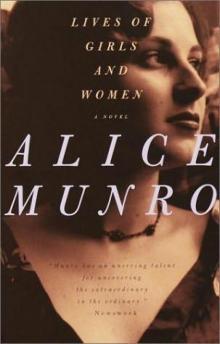 Lives of Girls and Women
Lives of Girls and Women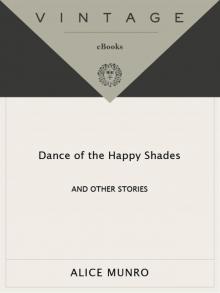 Dance of the Happy Shades
Dance of the Happy Shades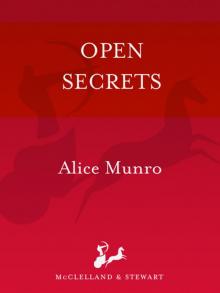 Open Secrets
Open Secrets Julieta (Movie Tie-in Edition)
Julieta (Movie Tie-in Edition)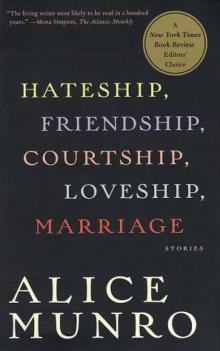 Hateship, Friendship, Courtship, Loveship, Marriage: Stories
Hateship, Friendship, Courtship, Loveship, Marriage: Stories Alice Munro's Best
Alice Munro's Best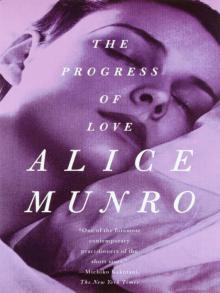 The Progress of Love
The Progress of Love Selected Stories
Selected Stories Away from Her
Away from Her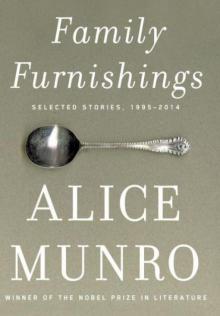 Family Furnishings
Family Furnishings Moons of Jupiter
Moons of Jupiter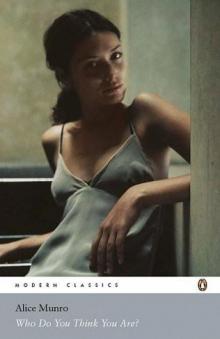 Who Do You Think You Are?
Who Do You Think You Are?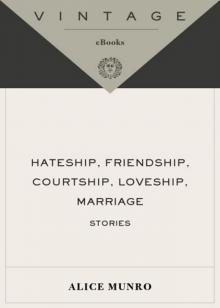 Hateship, Friendship, Courtship, Loveship, Marriage
Hateship, Friendship, Courtship, Loveship, Marriage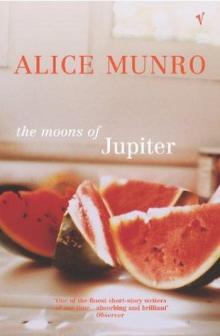 The Moons of Jupiter
The Moons of Jupiter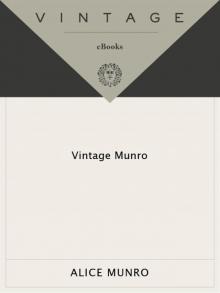 Vintage Munro
Vintage Munro The Love of a Good Woman
The Love of a Good Woman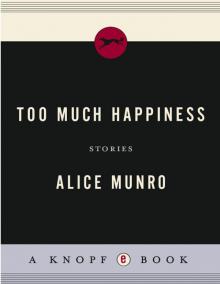 Too Much Happiness
Too Much Happiness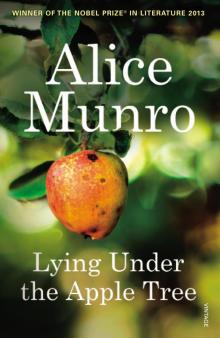 Lying Under the Apple Tree
Lying Under the Apple Tree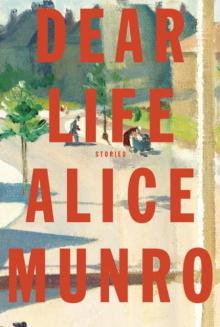 Dear Life
Dear Life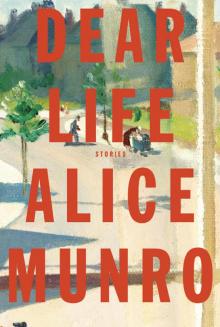 Dear Life: Stories
Dear Life: Stories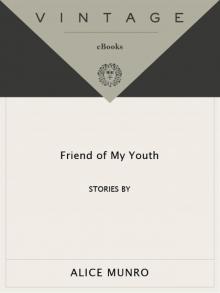 Friend of My Youth
Friend of My Youth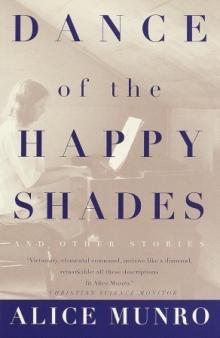 Dance of the Happy Shades: And Other Stories
Dance of the Happy Shades: And Other Stories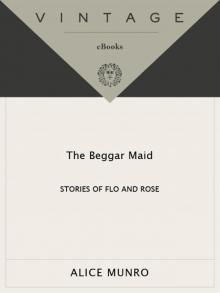 The Beggar Maid
The Beggar Maid